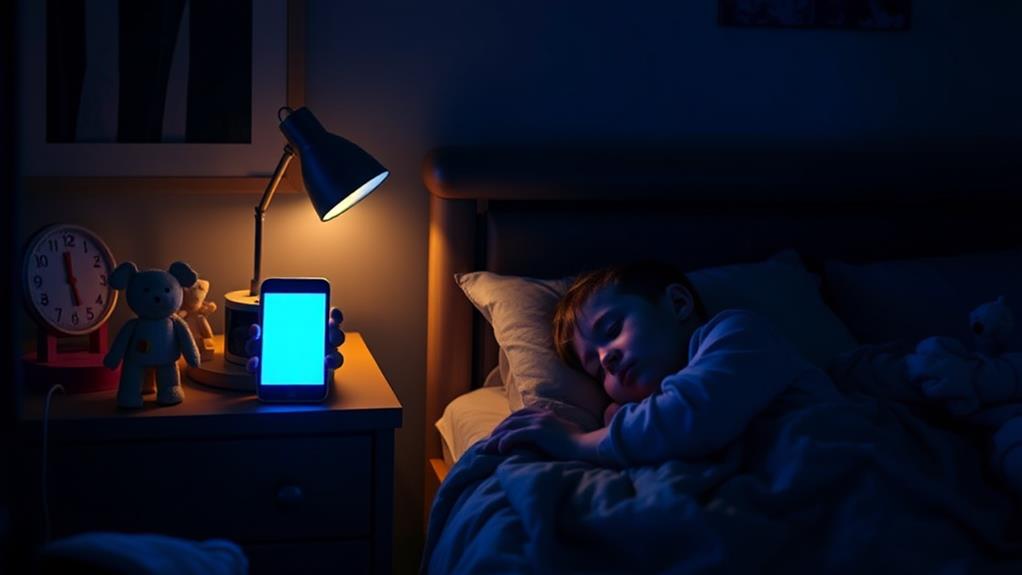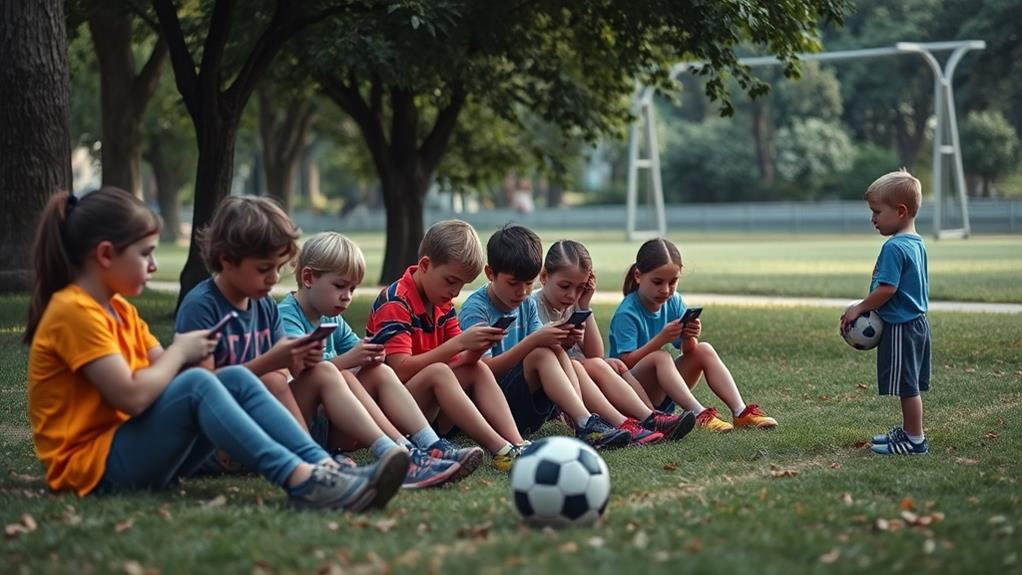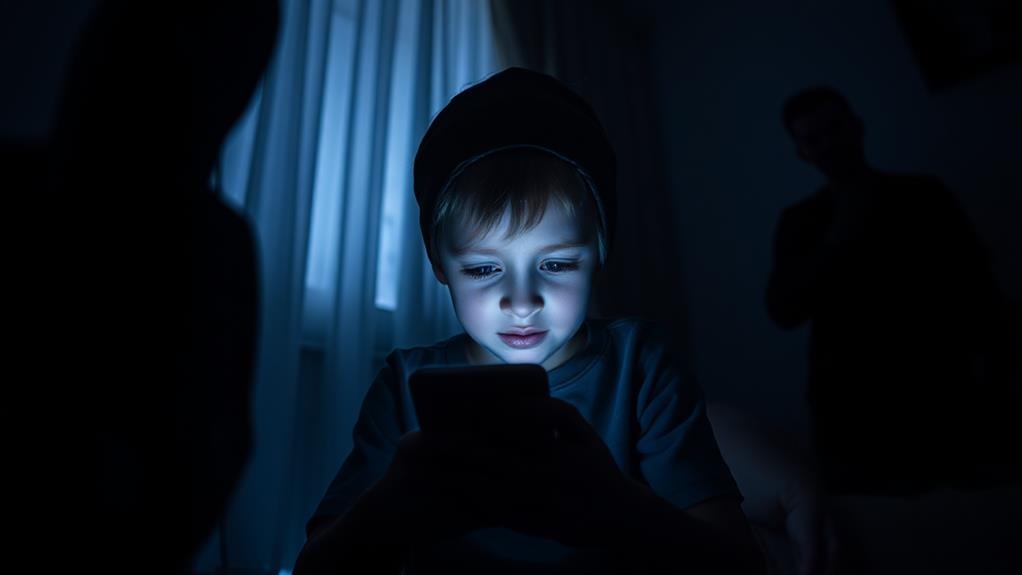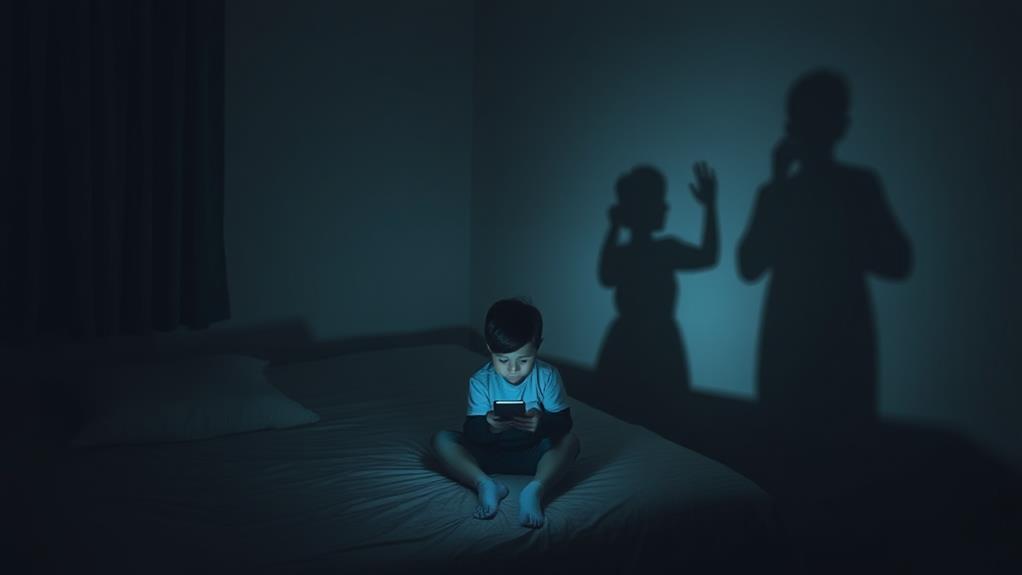You might think mobile phones are just tools for communication and entertainment, but they can actually harm kids in ways you wouldn't expect. From disrupted sleep patterns caused by blue light to increased anxiety levels stemming from social media pressures, the impacts are more profound than they seem. Reliance on screens can also stifle social skills and reduce attention spans, while exposure to inappropriate content poses its own risks. As you consider these factors, you may start to wonder how these elements intertwine and affect your child's overall well-being.
Disrupted Sleep Patterns

Many kids today are getting less sleep than ever, and their mobile phones are often to blame. When you scroll through social media late at night or binge-watch videos, you mightn't realize how these activities can disrupt your sleep patterns. The blue light emitted by screens can trick your brain into thinking it's still daytime, making it harder to fall asleep.
You might find yourself staying up late, just one more episode, or another round of scrolling, only to wake up tired and cranky the next day. This lack of sleep isn't just about feeling sleepy; it can affect your focus, mood, and even your performance in school.
Establishing a bedtime routine without screens can really help. By turning off your phone an hour before bed, you give yourself time to unwind, read a book, or listen to calming music.
Creating a restful environment can signal to your body that it's time to sleep. So, next time you reach for your phone at night, think about how it might be affecting your sleep. Prioritizing those precious hours of rest can make a world of difference for your health and well-being!
Increased Anxiety Levels
In today's digital age, constant connectivity through mobile phones can lead to increased anxiety levels among kids. It's not just the texts or social media notifications; it's the pressure to always be "on." You might feel like you need to respond immediately or keep up with everything happening online, which can be overwhelming. This constant expectation can create a sense of urgency that fuels anxiety.
Moreover, comparing yourself to others on social media can intensify feelings of inadequacy. When you see your friends posting perfect pictures or exciting events, it's easy to feel like you don't measure up. This can lead to self-doubt and worry about fitting in.
Also, the fear of missing out, or FOMO, can keep you glued to your phone. You might find yourself constantly checking for updates, which can interrupt your daily activities and make it hard to relax.
In short, while mobile phones can connect you to friends and family, they can also contribute to feelings of anxiety. Being aware of how much time you spend on your device and how it affects your mood is essential for maintaining a healthy mindset.
Impaired Social Skills

Constantly using mobile phones can significantly impair social skills in kids. When you rely on texting or social media to communicate, you might miss out on important face-to-face interactions. These interactions help you learn non-verbal cues, such as body language and facial expressions, which are crucial for building connections with others. Without practice, you may struggle to engage in conversations or understand the emotions of your peers.
Moreover, spending too much time on your phone can lead to feelings of isolation. While it might seem like you're connected online, those virtual conversations can't replace the warmth and bonding that happens in person. You may find it harder to initiate conversations, make eye contact, or even empathize with others when you're constantly glued to a screen.
Additionally, kids who are less socially engaged may struggle with teamwork and conflict resolution. These skills are vital not just in school but also in future workplaces.
To nurture your social skills, consider balancing your phone time with real-life interactions. Join clubs, play sports, or simply hang out with friends. Engaging in these activities can help you develop strong social skills that'll serve you well throughout life.
Reduced Attention Span
Studies show that kids who frequently use mobile phones often experience a reduced attention span. When you're glued to a screen, it's easy to get used to quick bursts of information. Text messages, social media updates, and gaming all demand your attention in short, exciting bursts.
This constant stimulation can make it tough to focus on tasks that require longer concentration, like homework or reading a book. You might find yourself easily distracted, jumping from one thing to another without really absorbing what you're doing.
Over time, this habit can spill over into other areas of your life, making it harder to pay attention in class or when hanging out with friends. Even everyday conversations can become challenging, as you might struggle to stay engaged without the instant excitement your phone provides.
To combat this, try setting aside phone-free time each day. Engage in activities that require your full attention, like sports or puzzles, which can help retrain your brain. Remember, developing a strong attention span is a valuable skill that will benefit you in school and beyond.
Exposure to Inappropriate Content

While struggling with attention spans, kids also face the risk of exposure to inappropriate content on their mobile phones. With just a few taps, they can access anything from violent videos to explicit material that isn't suitable for their age. This easy access can leave them feeling confused or even scared, as they mightn't fully understand what they're seeing.
You might think your child is only watching cartoons or playing games, but even seemingly harmless apps can lead to unexpected content. It's crucial to regularly check what they're downloading and viewing.
Setting up parental controls is a great way to filter out inappropriate material and create a safer browsing environment.
Encouraging open conversations about what they encounter online can also help. Ask them about their favorite apps and games, and discuss any content that doesn't seem right.
Teaching kids about online safety and the importance of reporting inappropriate content can empower them to navigate the digital world wisely.
Negative Impact on Physical Health
Many children are spending excessive amounts of time on their mobile phones, which can lead to significant negative impacts on their physical health.
The first concern you might notice is the decrease in physical activity. When kids are glued to screens, they often skip outdoor play, leading to a sedentary lifestyle. This lack of movement can contribute to weight gain and related health issues.
Additionally, prolonged phone use can strain the eyes. You may have heard of "computer vision syndrome," where kids experience discomfort, headaches, and blurred vision from staring at screens for too long. It's essential for them to take regular breaks to protect their eyesight.
Poor posture is another consequence. Kids often slouch or hunch over their devices, which can lead to back and neck pain over time.
Encouraging good posture and regular stretching can help combat this issue.




